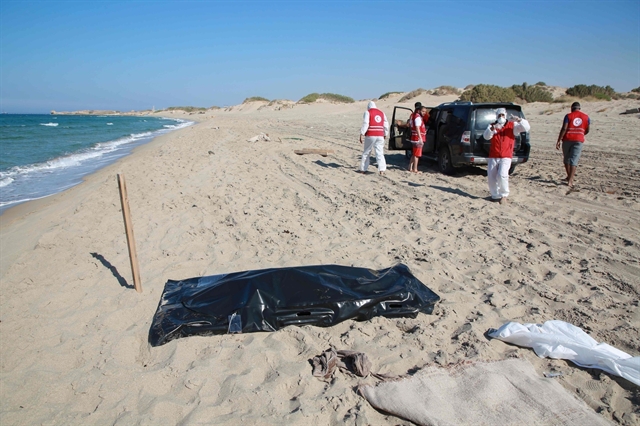 World
World


|
| Members of the Libyan Red Crescent have been recovering the bodies Members of the Libyan Red Crescent have been recovering the bodies. — AFP Photo |
TAJURA, Libya — Libyan authorities buried the bodies of 46 migrants on Sunday after they were plucked from the sea following one of deadliest shipwrecks in the Mediterranean so far this year.
Rescue workers said on Friday they had recovered the bodies of 62 migrants from waters off Libya after the overloaded boat went down off the city of Khoms, east of the capital.
Authorities said the bodies of the remaining 16 would be buried later.
Seven migrants rescued from the wreck helped lay their companions to rest.
"We were saved and here we are today to bury 46 of our brothers, children and women," Anwar, a young Eritrean survivor said.
It is unknown exactly how many were on the boat when it went down around 90 minutes after setting off from Libyan shores on Wednesday evening in a desperate bid to reach Europe.
Survivors said some 400 people were aboard the vessel when it sank, according to global charity Doctors Without Borders.
UN refugee agency chief Filippo Grandi called the wreck "the worst Mediterranean tragedy of this year".
Some 145 people were rescued, according to International Organisation for Migration, which reported more than 110 missing after the sinking.
Libya, which has been wracked by chaos since the 2011 uprising that killed president Moamer Kadhafi, has long been a major transit route for migrants, especially from sub-Saharan Africa, hoping to reach Europe.
Authorities on Saturday attempted to transport the bodies to a cemetery in the Tripoli suburb of Tajoura, but fighting in the area forced them to turn back.
They succeeded a day later, finally reaching the small plot of land surrounded by rocks and trees reserved for the bodies of those that have perished in bids to reach Europe by sea.
Many of the graves bear numbers instead of names.
Before the latest shipwreck, the United Nations High Commissioner for Refugees and the IOM said 426 migrants had perished in the Mediterranean this year. — AFP




